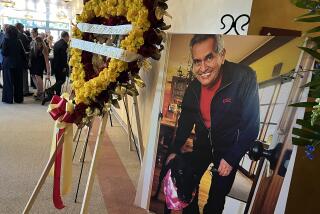Little Girl Lost
- Share via
Cardinal, and almost lost on many occasions in the monumental court time spent on this case, is the welfare of M------, the most charming, bright and precocious of children.
-Los Angeles Superior Court Judge Henry W. Shatford, in the matter of Henry Lozano vs. Angie and Richard Alatorre.
The house the little girl calls “her” house--though it’s her uncle’s house, really--sits at the end of a cul-de-sac. Halloween ghosts crowd the frontyard. You won’t see the child herself.
Inside, her bedroom is empty. Here are her white lace curtains and her porcelain dolls and the framed pictures of the mother she lost. Here they are, hugging. It’s Easter. Same heart-shaped face, same dark hair, same smile. Even with cancer, the mother was hauntingly lovely. The little girl believed for a long time that if she prayed hard enough, her Mommy could be resurrected. Such is the faith of a 7-year-old.
She is 10 now, a Catholic school girl who plays flag football and sings in the choir, and who was just learning to live again when a new tragedy burst into her home and forced her to leave. Charming and bright and precocious, the little girl is also very angry. She has good reason to be.
*
*
The sad, selfish case of Lozano vs. Alatorre has gone on for months, though its claim to fame has been its by-product: politics. “A bitter guardianship battle,” has been the media shorthand. Another term might be grown-up mud fest.
At odds, as they say, have been Henry Lozano, chief of staff to congressman Xavier Becerra (and alleged ally of Supervisor Gloria Molina), and Councilman Richard Alatorre, their old political foe. At issue is the child with the heart-shaped face, though that point has been hard to remember in the venomous pit that is the Eastside Latino political world.
The public mud has painted Alatorre as a corrupt and compromised politician; the private mud has been spread more equally. For example, because of the lawsuit, the world now knows that the child, who is the niece of Alatorre and his wife, Angie, was the product of an affair between Angie’s sister, Belinda, and Lozano, a long-married man.
Lozano lived with his wife and kids, but his lawyer says that, when he met Belinda at a political function--introduced, in fact, by Angie--he and his wife were “functionally separated” and had “a detente.” Belinda was childless and thought she was barren. When their little girl was born, Angie Alatorre says, “she was like a miracle.”
Belinda announced that she would be a single mother. Not even the birth certificate bore Lozano’s name. His lawyer says Lozano bought Belinda a house and treated her and the baby as a second family; Angie Alatorre says he charged them $600 a month rent.
In any case, the affair was over by the time the child turned 4. Belinda, her health failing, turned to the Alatorres for support. On her deathbed, she asked them to raise her daughter. They drew up the papers. Then Lozano came calling for the little girl.
*
*
Who knows why grown-ups do the things they do? Not the little girl. Age, regret, envy, love-- for whatever reason, Lozano wanted her, and so did Angie Alatorre, who had no children of her own. Lozano says that the moment the Alatorres took over, the little girl turned on him. His lawyer, yet another Eastside politician, struck back by dragging the Alatorres into court. Once there, he put the councilman on the stand, forcing him to admit to a cocaine addiction and fishy financial deals.
A spot drug test came back positive and instantly made headlines. It was a scandal both personal and political. Who had “family values”? Who was “moral”? The judge packed the child off to her grandma’s house, but you had to wonder: Which was the truer father? The flawed man who’d waited too long to claim his child? Or the flawed man who testified just to keep her, knowing it would ruin his career?
And where was the love? It was Alatorre whom the child called Daddy, Alatorre whom she’d visit at City Hall, hawking school candy to his aides. Lozano is 65. The little girl called him “Mr. Lozano,” said he was mean to her mama, told him to stop calling her “my gorgeous,” wouldn’t hold his hand.
And so it has gone, as Lozano has grasped clumsily for the heart of an angry child, while the Alatorres have charged that his sole aim is to ruin them and strong-arm her. Talk tends to run toward which of the adults is being hurt, as opposed to, say, what’s best for the little girl.
Which is how it goes, isn’t it? And not just in this case. We talk such a good game when it comes to kids. But when it comes to action, we can’t help it: We put ourselves first--in life as in politics.
Shawn Hubler’s column appears Mondays and Thursdays. Her e-mail address is shawn.hubler@latimes.com
More to Read
Sign up for Essential California
The most important California stories and recommendations in your inbox every morning.
You may occasionally receive promotional content from the Los Angeles Times.













